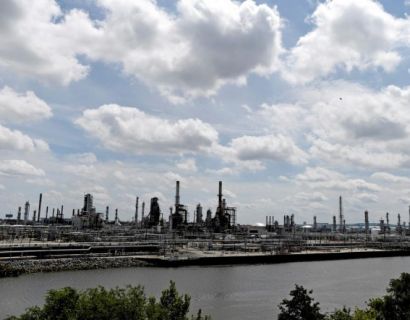Everything for  Business
Business
 Business
Business
 Business
Business
From coast to coast, U.S. refineries are available for the taking, but nobody is buying.

With the news that Royal Dutch Shell Plc is looking to unload its Anacortes, Washington, facility, there are seven different U.S. refineries on the block now, accounting for about 5% of U.S. crude oil processing capacity, according to data compiled by Reuters.
Even with U.S. energy production at an all-time record, these properties, located from Washington state to Pennsylvania, are having trouble finding bidders because of unfavorable locales, worries about falling margins, and the coming restart of nearby facilities in the Caribbean that will add to competition, bankers and analysts said.
Just one U.S. refinery transaction closed last year: Chevron Corp’s purchase of a Houston-area plant from Petrobras.
Prior to that, a flurry of corporate mergers saw independent refiners Alon, Western and Tesoro acquired by rivals. The consolidation left some acquirers, like Marathon Petroleum, with limited appetite or ability to consolidate the sector further.
“When some of your really big companies have stopped buying refineries, that really slows things down,” said Matthew Blair, head of refiners equity research at Tudor Pickering Holt & Co.
In addition, new international shipping fuel regulations, known as IMO 2020, and the U.S. renewable fuels standard that requires refineries to blend biofuels into their gasoline pool, has proved a deterrent, as both are seen as potentially detrimental for refining margins.
Last week, Exxon Mobil Corp said fourth-quarter results would decline from the year-earlier period, citing weak margins in refining and chemicals.
“Refiners don’t want to get overleveraged if they’re on the downside of the cycle where margins are eroding,” said Matt Flanagan, downstream energy practice director at Opportune, based in Houston.
PBF Energy Inc announced plans to buy a San Francisco-area refinery from Shell in June, but that transaction has still not closed as expected. The company was not immediately available to comment.
CVR Energy Inc, which operates two refineries, said in an October conference call that it failed to find a buyer for the company due to valuation disagreements.
East Coast assets have proven particularly tough to unload, as they lack both the scale of U.S. Gulf facilities and access to U.S. crude production. They also face competition from two shuttered Caribbean plants due to restart in coming months that have easier access to overseas crude and more flexible fuel distribution systems.
Philadelphia Energy Solutions put its 335,000-bpd refinery up for sale as part of a bankruptcy proceeding, and is expected to review bids in an auction next week. However, only one bidder has said it plans to revive refinery operations at the site, which shut last year after a fire.
Delta Airlines retained bankers to help sell its Trainer, Pennsylvania refinery almost a year ago, but has not found a buyer.
Exxon Mobil’s Billings, Montana refinery, which has access to local crude and logistics systems, may not sell if a buyer is unwilling to pay a premium for the plant, people familiar with the process said.
Beyond market risk, potential buyers must contend with environmental risk due to liability, and the possibility of high-profile disasters like last year’s blaze at Philadelphia Energy Solutions.
“Refiners don’t want to overpay for an asset with environmental liabilities that might require unknown capital expenditure to meet future requirements,” Flanagan said.
 What are you doing with your RV in the offseason?
What are you doing with your RV in the offseason?
 Adobe will buy online design startup Figma for $ 20 billion
Adobe will buy online design startup Figma for $ 20 billion
 To combat the gas crisis, Germany offers a new plan for cheap transit
To combat the gas crisis, Germany offers a new plan for cheap transit
 Porsche family seeks iPO buyout after tearful defeat
Porsche family seeks iPO buyout after tearful defeat
 Clubs and bars are popping up all over Manhattan, providing an alternative social hub and jobs.
Clubs and bars are popping up all over Manhattan, providing an alternative social hub and jobs.
This site uses cookies and other visitor identifiers for the convenience of each user. If you stay on our site after reading this message, it means that you have no objection to the use of these technologies. Learn more
